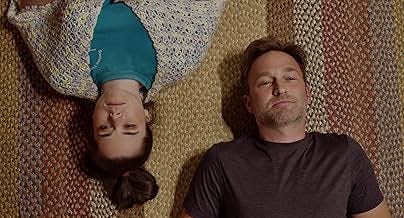Indy Film Fest: Never Not Yours
A pleasant-enough film about getting to know the people who you know as “family.”
For Indy Film Fest tickets and showtimes, click here.
In John Klein and Steve Kniss’ directorial collaboration, “Never Not Yours,” the premise revolves around how three adult children cope with the startling announcement that their retired parents are going to divorce. Now in a world that they never imagined before, it will demand that they start coming to terms with being able to see their relationships with their parents in a new light.
Throughout the film, we get introduced to a family from Nashville, Ind., who are all together for the first time in ages at the home in which they grew up. We have the oldest, Michael (Josh Bywater), who has what is described as the “perfect nuclear family and life,” by his younger brother. As predictable as a “well, this is Indiana” joke in a movie set in Indiana, we soon delve into how fractured and imperfect his life is under the proverbial curtain.
The middle child of the bunch is a woman named Ellie (Angela Morris), who works in the arts and has a committed relationship with her partner, Stephanie. Based on the first couple of scenes, it would be easy to see her as the typical “mid-kid” or “run-of-the-mill” child of the three. In an interesting enough swerve to the stereotype, it is quickly realized that she represents so much more to her family around her.
Lastly, we get the youngest of the bunch, James (Timmy Hart Barron). From the jump, we can identify this character. The fact is that we have all met someone like this in our lives. And on-screen this is as evergreen of a character as we get: non-committal, creative but not purposeful, a mama’s boy and a bandana-wearing young adult trying to figure out what to do with, well, his life. I did feel a bit attacked that his character had a bracelet and full facial hair with the look, but I am forgiving enough to let it go.
The first 20 minutes or so more or less portray a rough outline of each character. The viewer is given passing interactions between members of the family assimilating back into the “life at the childhood home” set-up. We have Dad helping the eldest with car problems, Mom chaperoning the daughter around the house and the youngest bouncing around to fill the space.
At the 20-minute mark, we get two pieces of news from the parents, Maddie (Laura T. Fisher) and Jonathan (John Lister). They are selling the house and getting a divorce. As you would imagine, any facade of the perfect family weekend is ripped away. Michael, as the oldest, tries to play peacemaker, while the other two children try to ascertain how something like this could be happening to people they have ever only seen as a married couple.
After the dust settles on the initial announcement and everyone decides to call it a night, the movie starts getting into what the new reality of their family means moving forward. It is also the point where I was eager to see how each of the characters would factor in for the last hour or so. What stood out right away was that Ellie acts as the center of the emotional web in this family.
She is her mother’s favorite (although she would never admit it), the only sibling her father is ever comfortable talking to for an extended time, and a sounding board for whatever is on the minds of her two brothers.
Whenever Ellie is on-screen you know others around her feel somewhat at ease and she’s a solid enough plot device indicating character details and motivations are about to be shared.
Most of the second half of the film largely adheres to what we expect from this type of film. There is an instance when an irate Michael and the other siblings drive to find more beer only to soon find themselves revealing how they earnestly feel about each other in a liquor store parking lot. All of the children then go on to have a night of revelry, as the parents can hear their fun. They even share a glance where you see them both grinning from ear-to-ear at each other, knowing that they at least succeeded in raising kids who can all get along. Only to be followed by a merry closing scene where they all promise to stay in touch and share hugs and promises to look after each other.
Even amidst the chaos of a family weekend back at home, I cannot help but think back on the relationship between James and his father. Throughout the film, Jonathan is the self-described “failure” of the family. He did not finish his undergraduate education, he jumps from odd job to odd job, he goes out with a new girl every week and he always seems to make a joke out of any situation (or so it seems). For Jonathan, though, it is his almost non-existent relationship with his father that stands out. On the flip side, his Dad means no ill will towards his son, but he is unable to get past his previous mistakes and shortcomings.
They eventually get to the point where they agree to call each other and make sure that James does not only become his, “mother’s son.” In James’ attempt to stay firm to that commitment, we see him make an appointment in his calendar to call his dad every week. I found that choice fascinatingly simple, yet effective, from the creative team. We can all think of the birthdays, anniversaries, and other momentous occurrences that we use our phone calendar as a tool to remind us. The mistake in this case would be to see an act like that as disingenuous. On the contrary, I find that having the humility to do it shows growth in this character in trying to make something out of his relationship with his father.
For most of us, we care about those around us and want to remind them that we do. Especially on their birthday. If I add your birthday to my calendar, you are going to be damn sure that I let you know how much you mean to me.
The film largely hovers around the relationships between adult siblings and how your idea of your parents changes as you age. However, it is the point above about how our sometimes unremarkable attempts to show how much we care about someone can make all the difference. I am not sure if that was the intent of the creative team, but I am glad that I was able to acknowledge that aspect of the film once the credits started rolling. Whether it is the dynamic between the siblings, the setting of a family weekend, or relating to the shift in one’s relationship with their parents, I am sure you will have an emotional reaction to the film too.





